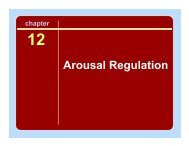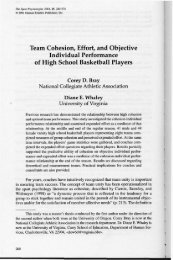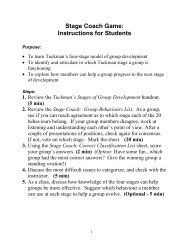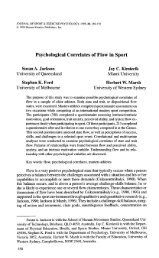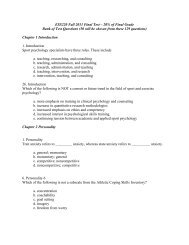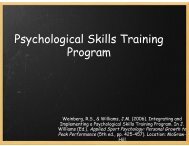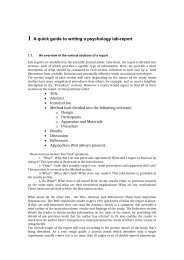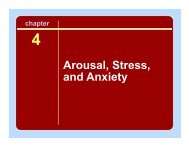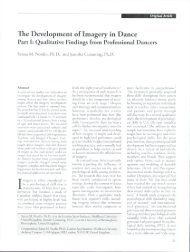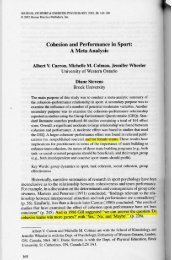Sport and Exercise Psychology Review - Sport Psychology Goes to ...
Sport and Exercise Psychology Review - Sport Psychology Goes to ...
Sport and Exercise Psychology Review - Sport Psychology Goes to ...
You also want an ePaper? Increase the reach of your titles
YUMPU automatically turns print PDFs into web optimized ePapers that Google loves.
Jeffrey J. Martin<br />
Travel challenges<br />
Traveling <strong>to</strong> competition sites for extended<br />
periods of time often means not being able<br />
<strong>to</strong> give or receive emotional support which<br />
can cause stress. Stress can clearly disrupt<br />
concentration <strong>and</strong> impact performance<br />
(Campbell & Jones, 2002a, 2002b). Furthermore,<br />
travel-related relationship issues may<br />
be viewed negatively (i.e., threatening vs.<br />
challenging) <strong>and</strong> quite severely compared<br />
<strong>to</strong> other sources of stress (Campbell &<br />
Jones, 2002a, 2002b). Travelling across time<br />
zones, trying <strong>to</strong> underst<strong>and</strong> foreign languages,<br />
<strong>and</strong> enduring different climates (e.g<br />
excessive heat <strong>and</strong> humidity) all take a <strong>to</strong>ll<br />
on individual’s emotional <strong>and</strong> physical<br />
resources (Banks, 1992). Finally, at major<br />
competitions such as the Paralympics, athletes<br />
often cannot practice at the competition<br />
site. In such cases, obtaining video<br />
tapes or even one-dimensional pictures of<br />
the competition site can faciliate imagery of<br />
the course or facility.<br />
Effective training <strong>and</strong> competing<br />
Athletes need intelligent coaching <strong>to</strong> achieve<br />
sport success. Research examining coaching<br />
practices in disability sport is not encouraging.<br />
Although coaches (N = 239) of athletes<br />
from the six national disability sport organisations<br />
in the USA indicated that they<br />
coached athletes on a regular basis (i.e., at<br />
least once a week), most other research is<br />
less supportive (DePauw & Gavron, 1995).<br />
For instance, only 58 per cent of 319 elite<br />
adult athletes stated that they had coaches<br />
who directed their training sessions (Ferrara<br />
& Buckley, 1996).<br />
One-third of an international group of<br />
wheelchair racers, throwers <strong>and</strong> swimmers<br />
reported that they did not have a coach<br />
(Liow & Hopkins, 1996). Within this group<br />
swimmers were coached regularly, whereas<br />
the throwers <strong>and</strong> wheelchair racers received<br />
little coaching (Liow & Hopkins, 1996). In<br />
1994, few wheelchair racers were reported <strong>to</strong><br />
have coaches in the United Kingdom<br />
(Williams & Taylor, 1994) <strong>and</strong> in the USA<br />
most coaches are volunteers without a sport<br />
science background (Hedrick & Morse,<br />
1995a). Athletes may train inappropriately<br />
regardless of whether they are coached or<br />
self-coached. Liow <strong>and</strong> Hopkins (1996)<br />
reported that many elite athletes with disabilities<br />
trained in ways that were not sport<br />
specific <strong>and</strong> they tapered poorly. Research by<br />
Watanabe et al. (1992) found that some athletes<br />
overtrained on recovery days, <strong>and</strong><br />
Hedrick, Morse, <strong>and</strong> Figoni (1988) indicated<br />
athletes trained inconsistently, suggesting<br />
that athletes would benefit from improved<br />
coaching. Athletes have also reported a lack<br />
of availability of training material (Williams<br />
& Taylor, 1994) <strong>and</strong> may quit sport because<br />
of a lack of training information (Williams &<br />
Taylor, 1994).<br />
<strong>Sport</strong> psychologists should underst<strong>and</strong><br />
their athletes’ training <strong>and</strong> can help athletes<br />
obtain quality coaching <strong>and</strong> educational<br />
materials. Glucose drinks, for instance, can<br />
improve wheelchair performance (Spendiff<br />
& Campbell, 2003). Textbooks discussing<br />
disability specific coaching principles <strong>and</strong><br />
techniques exist (e.g DePauw & Gavron,<br />
1995; Jones, 1994; Owen, 1982; Steadward,<br />
Wheeler & Watkinson, 2003; Winnick, 2000)<br />
<strong>and</strong> <strong>Sport</strong>s ’N Spokes, a monthly magazine,<br />
publishes sport science information about<br />
wheelchair sports (see www.pvamagazines.<br />
com/sns).<br />
Leaving sport<br />
Elite athletes (i.e. Paralympians) often have<br />
very brief careers (e.g two years) that start<br />
shortly after (e.g two years) an acquired disability<br />
(Wheeler et al., 1996). Because of<br />
this timing, sport psychologists working<br />
with Paralympians may also find themselves<br />
assisting athletes with the transition out of<br />
sport. Acceptance <strong>and</strong> adjustment <strong>to</strong> a<br />
major trauma (e.g SCI) often takes up <strong>to</strong><br />
two years (Wheeler et al., 1996), <strong>and</strong> selfesteem<br />
stabilisation for individuals with SCI<br />
may take up <strong>to</strong> four years (Trieschmann,<br />
1988). Thus, athletes may have <strong>to</strong> cope with<br />
their disability <strong>and</strong> with leaving sport<br />
(Wheeler et al., 1996). Additionally, athletes<br />
may be dealing with a ‘secondary disability’<br />
36 <strong>Sport</strong> & <strong>Exercise</strong> <strong>Psychology</strong> <strong>Review</strong> Vol 1 No 2



